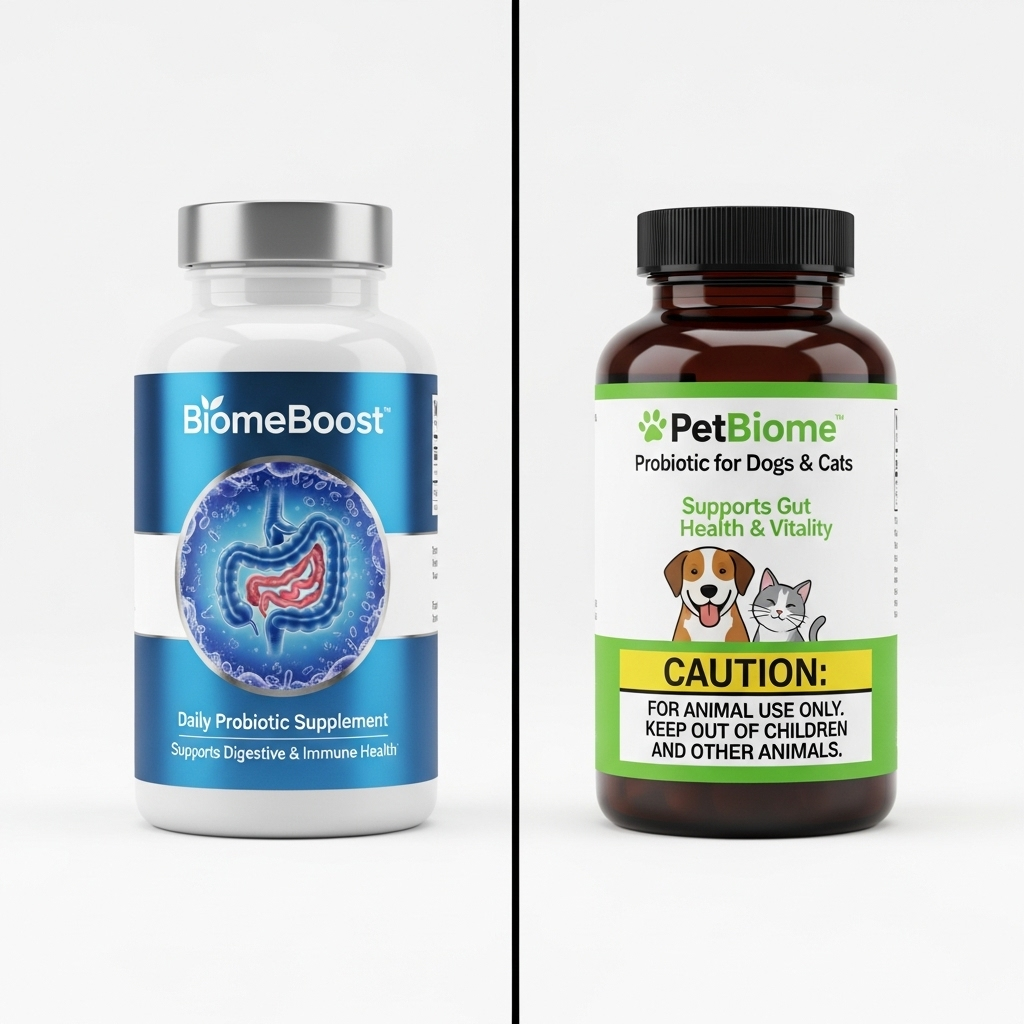Can Dogs or Cats Take Human Probiotics Safely?

Many pet owners wonder whether they can give their dog or cat the same probiotic they use themselves. Probiotics—live microorganisms that can support gut health—are widely available for humans, and some are advertised for pets. The short answer is: sometimes, but with important caveats. This article explains what probiotics are, when human products might be acceptable for pets, potential risks, how to choose and dose safely, and when to check with your veterinarian.
What are probiotics?
Probiotics are specific strains of bacteria or yeasts that, when given in adequate amounts, may benefit the host by supporting a healthy gut microbiome, improving digestion, or reducing the frequency or severity of diarrhea. Common probiotic groups found in supplements include Lactobacillus, Bifidobacterium, Enterococcus, Bacillus, and the yeast Saccharomyces boulardii.
Probiotic strains commonly used for pets
- Enterococcus faecium (some veterinary products use specific strains such as SF68)
- Lactobacillus species (e.g., L. acidophilus, L. rhamnosus)
- Bifidobacterium species
- Bacillus coagulans and Bacillus subtilis
- Saccharomyces boulardii (a probiotic yeast often used for diarrhea)
Pet-specific products list strains and colony-forming units (CFU) appropriate for animals; human products may contain similar organisms but are formulated for people.
Can pets take human probiotics?
Giving a human probiotic to a dog or cat is sometimes safe but not always recommended. Many human probiotics contain species that are also beneficial to pets, and healthy animals often tolerate them without problems. However, differences in strains, dose, inactive ingredients, and product form can make human probiotics unsuitable in certain situations.
When it might be acceptable
- Short-term use for mild, self-limited diarrhea in an otherwise healthy pet, after consulting your vet.
- If the human product contains a well-known, pet-safe strain (for example, Saccharomyces boulardii is commonly used in both people and animals).
- If a veterinarian approves the specific product and dose for your pet’s weight and condition.
When to avoid human probiotics for your pet
- Pets that are very young, very old, critically ill, or immunocompromised—there is a small risk of bloodstream infection (bacteremia or fungemia) in these groups.
- Products that contain xylitol or other artificial sweeteners—xylitol is highly toxic to dogs and can be found in chewable or flavored human supplements.
- Chewables or tablets with other inactive ingredients, flavorings, or additives that might be harmful or cause GI upset.
- If your pet has a central line or intravenous catheter, or is hospitalized—do not give probiotics without veterinary direction.
How to choose and give probiotics safely
Follow these practical steps before giving a human probiotic to a pet:
- Talk to your veterinarian first. They can recommend a pet-specific product or tell you if a human product is appropriate for your pet’s health, weight, and condition.
- Check the ingredient list. Avoid products with xylitol, large amounts of sugar, or unnecessary additives. Prefer products that list strains and CFU counts clearly.
- Consider a pet-specific formula. These are calibrated for animal weights and often use strains with veterinary research.
- Start with a very small amount and watch for side effects for 24–72 hours—vomiting, increased diarrhea, bloating, or signs of discomfort.
- Be cautious if your pet is on antibiotics. Some probiotics may be less effective or interact with antibiotic therapy; Saccharomyces boulardii, a yeast, can be given with antibiotics because it’s not affected by them, but discuss with your vet.
- Store per label instructions. Some probiotics require refrigeration to maintain potency.
Pros and Cons
| Pros | Cons |
|---|---|
| May reduce duration of diarrhea or antibiotic-associated GI upset in healthy pets | Human formulations may contain xylitol or other toxic additives for dogs and are not always optimized for pets |
| Some strains (e.g., S. boulardii, certain Lactobacillus strains) are used successfully in both people and pets | Wrong strain or dose could be ineffective or cause mild GI upset (vomiting, gas, diarrhea) |
| Convenient if a veterinary product is not immediately available and vet approves | Rare risk of bloodstream infection in immunocompromised, critically ill, or very young/old animals |
FAQ
Q: Can I give my dog a human probiotic capsule by opening it and sprinkling on food?
A: Sometimes, but only if your veterinarian approves the specific product. Some capsules are enteric-coated and opening them may reduce effectiveness. Also check for harmful additives like xylitol in flavored powders or chewables.
Q: Which probiotic strains are safest for dogs and cats?
A: Strains often used safely in pets include certain Lactobacillus and Bifidobacterium species, Enterococcus faecium (specific veterinary strains), Bacillus species, and Saccharomyces boulardii. Pet-specific products will list strains supported by veterinary research.
Q: Can probiotics cause diarrhea or vomiting?
A: Yes—some pets may experience increased gas, bloating, vomiting, or diarrhea when first started. These effects are usually mild and self-limiting. Stop the probiotic and call your vet if symptoms are severe or persistent.
Q: How long should I give a probiotic to my pet?
A: Duration depends on the reason (e.g., short courses for antibiotic-associated diarrhea vs. longer use for chronic digestive issues). Your veterinarian can recommend an appropriate length of treatment based on the condition and response.
Key Takeaways
- Some human probiotics can be used safely in pets, but vet approval is recommended first.
- Check ingredients—avoid products with xylitol, unnecessary additives, or flavors that could harm pets.
- Pet-specific probiotics are often a safer and more convenient choice because they list strains and doses tailored to animals.
- Watch for side effects (vomiting, diarrhea, bloating) and stop the product if your pet worsens.
- Pets that are very young, old, critically ill, or immunocompromised should not receive probiotics without veterinary supervision.
Disclaimer: This article is for informational purposes only and does not replace professional veterinary advice. Always consult your veterinarian before starting any supplement, especially if your pet has health issues or is on medications. The author and publisher are not responsible for adverse effects from using or misusing probiotics.

Leave a Reply